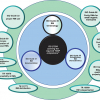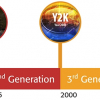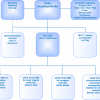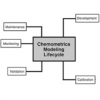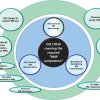Articles
John Hammond continues his series of Quality Matters Columns looking at Four Generations of Quality, with one on the developments of the ISO Technical Committee responsible for reference materials to its latest incarnation as a Technical Committee.
John Hammond continues his journey through four generations of quality with “’Don’t risk it’. Accreditation standards and their role in quality assurance”. John reviews the two main ISO 17000 series accreditation standards—ISO/IEC 170251 and ISO 17034—their impact on quality assurance, testing or calibration laboratories, and how these standards have evolved and continue to be implemented.
John Hammond describes the start of a new mini-series of column articles and what you can look forward to in the next few issues.
The Quality Matters Column highlights how the reference material industry has grown. Peter Jenks asks for your help in rerunning a 2001 survey with aim of establishing how users’ use of and experience with reference materials has changed. Whilst most questions are optional, such surveys are of the greatest value if most questions are answered. We hope you can spend a few minutes to complete the survey at https://www.spectroscopyeurope.com/reference-material-survey-2019.
Peter Jenks is thinking about the new definition of the kilo, and other SI units, in “The kilo, the mole and the commutability of a result to activity”. However, he is more concerned with maintaining accurate laboratory measurements over time, which is crucial to making data comparable.
John Hammond updates us on news from the latest ISO/REMCO meeting and implementation of the new 17000 series standards.
Chris Burgess and John Hammond are back with an “Update on the modernisation of the spectroscopic General Chapters in the United States Pharmacopeia (USP)”. They review progress over the last three years and particularly on the changes intended in the USP Review Cycle 2015 to 2020.
Peter Jenks and Alan Nichols embark on “ISO/IEC 17025: a never-ending journey”. They describe what is behind this recent standard and give valuable advice as to what to expect from an audit. Newcomers may find the requirements daunting, but Peter and Alan’s guidance will prove most helpful.
John Hammond updates us on “Reference materials: what’s new?”. The 2015 meeting of the ISO Committee on Reference Materials (ISO/REMCO) was held in June and significant developments in a number of standards that will ultimately affect all users of reference materials have taken place.
C. Burgess and J.P. Hammond outline the work that has been undertaken to modernise the spectroscopic General Chapters in the United States Pharmacopeia (USP).
John Hammond and Chris Burgess are also in the middle of a multi-part contribution to the Quality Matters column. “…that’s what I thought you said?” looks at further misundertandings in terminologies surrounding Reference Materials, and sets the record straight.
Peter Jenks clarifies “What is a ‘Primary Standard’?”.
John Hammond reports on important developments at the ISO Committee on Reference Materials (ISO/REMCO) annual meeting.
Peter Jenks and John Hammond describe how the important ISO 17025 standard has developed, and point out that a review for the third edition of the standard will start soon. All those with an interest in quality standads—an increasing number of us—should make sure their voice is heard at their local standards body.
Peter Jenks and John Hammond continue their series on “CRMs and PT in an ISO 17025 accredited laboratory” with instructions on how you can prepare your own in-house certified reference materials.
Peter Jenks looks at some current trends in the supply of CRMs and proficiency testing and highlights difficulties labs may have been when no commercial CRM is available. This will be followed with a second part looking at the production of in-house reference materials.
Peter Jenks gains new respect for microbiologists and learns that the way they approach analytical quality control is different from chemists.
Chris Burgess and John Hammond respond to Peter Jenks' thoughts in the last issue's Quality Matters Column. Please join in the debate and add your comments at the end of the article.
The reasoning behind strict compliance to an ISO Standard is logical, but the consequences can be commercially questionable, if not unsound. Peter Jenks, and many other scientists, are starting to question the commercial viability of all this regulation. What is your opinion?
Peter Jenks is concerned at the lack of mutual help available on the Internet within the field of analytical chemistry. Other fields, outside science, have strong communities where enthusiasts give freely of their advice and time; why not in analytical chemistry? Please tell us your views by adding a comment to this column article.

